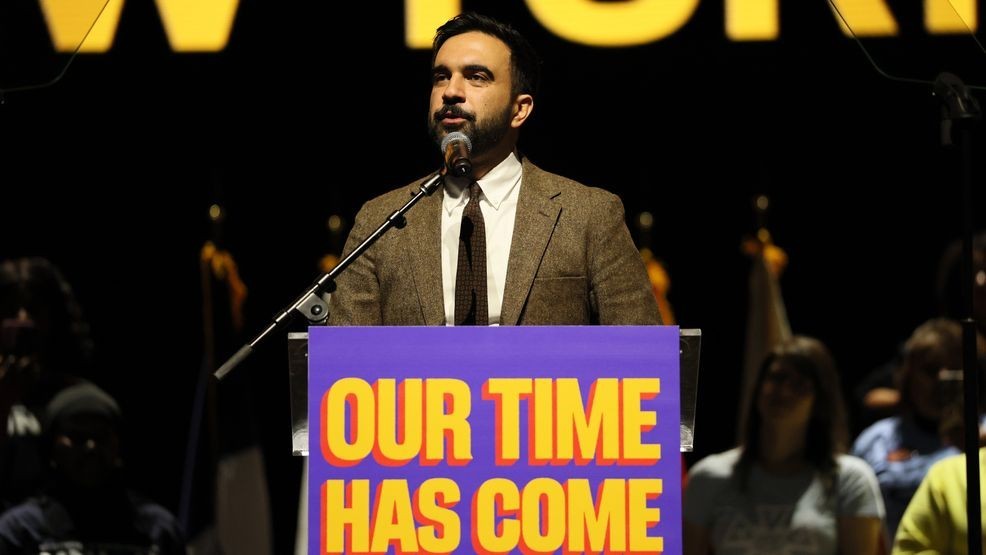(TNND) — Economists and business leaders are sounding an alarm over Zohran Mamdani’s policy proposals for New York City.
Mamdani, a 33-year-old state lawmaker and democratic socialist, is the front-runner in the city’s mayoral race.
And he’s proposing about $10 billion in new spending if elected.
He’s tethered his campaign to affordability concerns in America’s largest city.
Mamdani advocates for rent freezes, free bus service, free childcare, and city-owned grocery stores.
Mamdani beat former Gov. Andrew Cuomo in the Democratic primary, forcing Cuomo to take on an independent run for the office.
And Mamdani still faces Republican Curtis Sliwa, who is a long shot in the heavily Democratic city.
Current Mayor Eric Adams recently dropped out of the race.
Mamdani said at a mayoral debate Thursday that he wants to tax “the wealthiest and the most profitable corporations the fair amount that they should pay.”
He said the free bus service would cost $700 million a year.
He said universal childcare would cost about $5 billion or $6 billion a year.
Mamdani wants to raise the state’s top corporate tax rate, which he couldn’t do by himself.
He also claimed he could find $1 billion in savings in the city budget through procurement reform and other measures.
Mamdani is among a handful of young socialists running to lead major American cities, including Omar Fateh in Minneapolis and Katie Wilson in Seattle.
But Ryan Bourne, an economist at the Cato Institute, called Mamdani’s policies to tackle New York City’s affordability crisis “an unhealthy cocktail of price controls and vast new government spending on services.”
Price controls, Bourne said, are opposed by almost all economists.
They generate inefficiency, he added.
And history shows that tighter rent control leads to lower quality rent-stabilized housing, with people in homes that aren’t suited to their needs and less investment in new construction.
Larry Summers, who served as Treasury Secretary under President Bill Clinton, told Bloomberg Television in June that a Mamdani victory would be “one of the greatest gifts that’s ever been given to the economies of Florida and of Texas.”
Summers said entrepreneurs and successful people would flee New York City for places with more favorable business environments.
“It has been said that rent control is the second-best way to destroy a city after bombing,” Summers said.
He said it strips away incentive for investment in building construction and maintenance.
Bess Freedman, the CEO of New York City real estate firm Brown Harris Stevens, gave a similar message during a Bloomberg interview.
As bad as affordability is in the city, she said that rent freezes would be damaging to landlords, many of whom don’t have vast holdings of real estate.
“It’s wonderful, like, to pretend you’re a Robin Hood and you can just wave a wand and do that, but it doesn’t work that way,” Freedman said.
But Freedman was skeptical of a business exodus if Mamdani wins the election.
She called New York “the greatest city in the world” and a “singular” place where successful people would still want to live.
“And I don’t think what Mamdani is saying he would do is even possible,” she said. “I don’t think he would be able to do the things he proposes, but it sounds good to people because they’re desperate.”
Kathryn Wylde, the CEO and president of Partnership for New York City, told CNBC that the business community is very concerned about Mamdani’s policies.
But she also said that political support was mixed for the candidates within the business community.
And Wylde downplayed the impact any particular mayor would have on the fate of the city.
“I think New York City has proven that we’re highly resilient, that we have survived plenty of less than adequate mayors,” Wylde told CNBC a couple of weeks ago. “We’ve survived lots of bad public policies. I think we’ll be successful moving forward.”
Bourne told The National News Desk on Friday that Mamdani’s plan to roughly double New York City’s minimum wage to $30 by 2030 would likely push low-skilled workers out of jobs. And he said the massive minimum wage hike would likely push economic activity away from the city.
Free buses would have to be subsidized by taxpayers, necessitating expensive investment and upgrades to ensure a reasonable service, Bourne said.
He said government-run grocery stores are a terrible idea.
Without a profit motive and industry discipline, keeping food affordable within them would require heavy government subsidies, he said.
Bourne said that could lead to empty shelves and black markets as the food is resold if prices really do undercut market rates.
Free childcare is also extremely expensive, with staffing the major cost of providing childcare.
“While nobody doubts good quality care can help disadvantaged kids, such untargeted subsidies for everyone seem unjustified,” Bourne said via email.
Bourne said Mamdani wants to impose a 2% income tax surcharge on those with incomes over $1 million. But he said raising taxes on highly mobile, high-income people risks the exodus Summers also warned about.
And Bourne said the state, not New York City’s mayor, holds the power to change the corporate tax rate.
“Because of this dependence on Albany, much of this price-fixing and subsidy agenda might not happen,” Bourne said. “While he can appoint people to the Rent Control Board and tinker with grocery store experiments, the expensive programs like childcare and bus travel require recurring state funding and approval. He also doesn’t have the power to set a city minimum wage yet, nor pay for more affordable housing, nor raise corporate taxes without Albany action. So my guess is that a lot of this agenda won’t happen—unless Albany politicians presume there’s a huge popular mandate for this statewide.”

